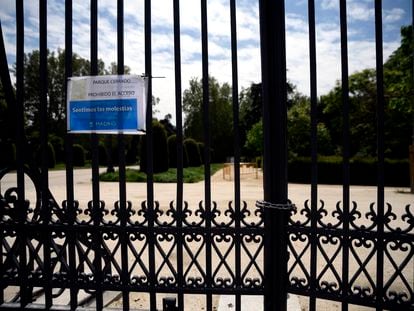As half of Spain moves to Phase 1 of coronavirus deescalation, what will change?
From Monday, citizens in many areas of the country will be able to meet in groups of up to 10, while small businesses can reopen their doors under strict conditions
/cloudfront-eu-central-1.images.arcpublishing.com/prisa/KEK767MY5FG5JKFEM6EG7S2QUA.JPG)

The progressive phases of Spain’s coronavirus deescalation plan involve ever-greater freedom of movement for citizens in the country. Until now, just four of Spain’s islands have moved from Phase 0 to Phase 1: El Hierro, La Graciosa, La Gomera and Formentera. But last night, the government announced that more than half of the country’s population will also move to Phase 1, meaning that residents will be able to visit loved ones, attend funerals, go shopping without a prior appointment and have a drink at a street café. Click here to see the full list of areas that will change phase on Monday.
The executive has set out a series of general measures included in Phase 1, although regional governments will be able to include specific details in their plans. Here are responses to the most frequently asked questions regarding the next phase according to the details set out in the Official State Gazette (BOE), which was published on Saturday morning.
Can I travel to another province?
No, but travel within a province, island or healthcare area that has entered Phase 1 will be permitted.
Will timetables for taking exercise be maintained during Phase 1?
The timetables will still be in place, but each region can adjust them to suit their needs. Some regions have already requested modifications to the timetable for children, given the hot weather during the middle of the day.
What are the timetables for taking walks and other sport?
Ahead of their possible modification by region, walks and other exercises, such as running and cycling, must take place between 6am and 10am, or between 8pm and 11pm. Outings with children have to take place between 12pm and 7pm. People who need to go out with a caregiver and seniors over 70 years of age have their own time slots of 10am to 12pm and 7pm to 8pm.
What will happen with schools during Phase 1?
The BOE sets out that they will be able to open, avoiding crowds, so that students whose parents cannot take care of them due to work commitments can attend.
Schools and universities will also reopen so that they can be disinfected, and adapted ahead of the eventual return of students.
How many people are allowed to meet?
Meetings of up to 10 people are permitted under Phase 1, both outside and in private homes.
What are the conditions for working under Phase 1?
The BOE recommends that people continue to work from home where possible. In workplaces, meanwhile, there must be a distance of two meters between employees and the use of individual protection equipment is obligatory when this not possible. Entry and exit from workplaces should be staggered. Systems that identify employees by their fingerprint must not be used. Workers who need a uniform or other work clothes must wash them daily, at temperatures of between 60 and 90ºC.
Can I sit at a street café and have a drink?
Yes, provided there is room, given that only 50% of tables on terraces can be occupied. There will have to be a minimum distance of two meters between tables, and groups of customers cannot number more than 10. Such establishments will not yet be able to open their indoor dining areas, but will still be able to offer food to take away, as they could under Phase 0.
Restaurants and bars will have to prioritize single-use tablecloths, and under no circumstances can a fabric tablecloth be used for more than one customer. Such items will have to be washed at temperatures of between 60 and 90ºC.
Such businesses will have to provide hand gels and disinfectants at the entrance and physical menus will not be provided to customers. Items such as serviette dispensers, toothpicks and oil and vinegar bottles will also not be used, in favor of single servings of the latter.
What changes will be applied to stores and other small businesses?
Only premises measuring under 400 square meters will be permitted to open, as is the case under Phase 0. An exception here will be premises located in parks or shopping malls where there is no direct access from outside. Stores will be able to allow customers in up to 30% of their usual capacity, and a two-meter safe distance will have to be observed between customers. A preferential timetable for the over-65s must be established. Promotional campaigns that could attract a large number of customers will not be permitted.
What other businesses can reopen?
The BOE permits vehicle dealerships to restart activity, as well as ITV vehicle inspection centers. Also to reopen are garden centers, whatever their size, as long as an appointment system is implemented. All establishments that open to the public will have to disinfect their premises twice a day.
Will libraries reopen?
Yes, but cultural activities cannot be held in such premises during Phase 1 and objects lent to members of the library must be quarantined for two weeks.
Is tourism permitted?
According to the BOE, “active tourism” is permitted, such as nature excursions.
Will museums open?
Yes, visits to museums can begin once more, also limited to a third of capacity.
Will street markets reopen?
Yes, open-air street markets will return if permitted by local councils, albeit with restrictions relative to the distance between stands and controls on capacity by the authorities. The number of usual stands will be limited to 25%, while the public will be limited to a third of usual capacity.
What will happen with hotels?
Hotels can reopen with no limit on rooms, but there will be restrictions on the use of common areas such as restaurants.
Are funeral wakes allowed?
Yes, but the number of relatives will be limited to 15 in open-air spaces, and 10 in closed areas.
Can I go to church or other places of worship?
Yes, places of worship will open in Phase 1, but the number of attendees will be reduced to a third of usual capacity. All attendees must wear masks and avoid the distribution or exchange of any object in order to minimize the risk of spreading the virus.
What does the BOE say about sport?
The order published today allows for the reopening of high-level sports centers, although athletes can only be accompanied by a coach. The exception here is for minors or anyone with a disability, and who requires more than one companion. Open-air sports facilities can restart activity via an appointment system. After each event, the installations must be disinfected.
Can I travel between Spain’s islands?
All of the Balearic and Canary Islands will move to Phase 1 on Monday, meaning that internal boat and plane routes connecting the archipelagoes will restart as well. Flights to the peninsula, however, will still be restricted and can only be taken for essential reasons.
Flights between islands in the Canaries and the Balearics will have to offer the maximum space possible between passengers, and as such just 50% of the capacity of each plane will be available to the public.
Can I use a recreational vessel?
The latest BOE permits the use of recreational or sports boats between ports or points on the coast in the same municipality and nearby uninhabited islands. This will be applied in areas in Phase 0 and Phase 1, i.e. in all of Spain. In the Canary Islands, tourist passenger vessels will also be allowed to sail, but not cruise ships.
Use of vehicles
The government has decided to backtrack on one of the measures that had been most criticized by the public: restrictions on the use of vehicles by people living together. In a new order, which will come into force at midnight on Sunday May 10, those who live in the same residence will be able to travel in the same car, occupying all of the seats and without having to wear a mask.
This will apply to areas that are in Phase 0 as well as Phase 1 – i.e., the entire country.
In the case of those who are not living in the same residence, two people are allowed to travel in each row of seats, “providing that they use a mask and respect the maximum distance possible between occupants.”
The change also applies to public transport vehicles with up to nine seats. This means that, for example, a mother will now be able to sit in the same row of seats in a taxi with her two children rather than separated in different rows.
Motorcyclists, meanwhile, will be able to share a vehicle without the use of a mask if they live together.
Second residences
The issue was not specifically dealt with in the Official State Gazette published on Saturday that set out the conditions of Phase 1, and what’s more, Health Ministry sources stated on Saturday morning that it would not be possible.
However, this was contradicted by Spanish Prime Minister Pedro Sánchez when questioned on the issue during a press conference he gave this afternoon. The Socialist Party (PSOE) politician confirmed that citizens could, in fact, travel to second residences under Phase 1, provided they were located in the same province as their primary residence.
This was later confirmed by sources from La Moncloa, the prime ministerial palace.
Under Phase 1, citizens will also be able to travel to hotels and tourist accommodation in their own province, albeit with restrictions on the use of common areas such as dining rooms.
Reporting by Emilio de Benito.
With reporting by Cinco Días, Oriol Güell and Emilio de Benito.
English version by Simon Hunter.
/cloudfront-eu-central-1.images.arcpublishing.com/prisa/4DDQUWOMOFE3BPY6TT2IYZF3FE.JPG)











































